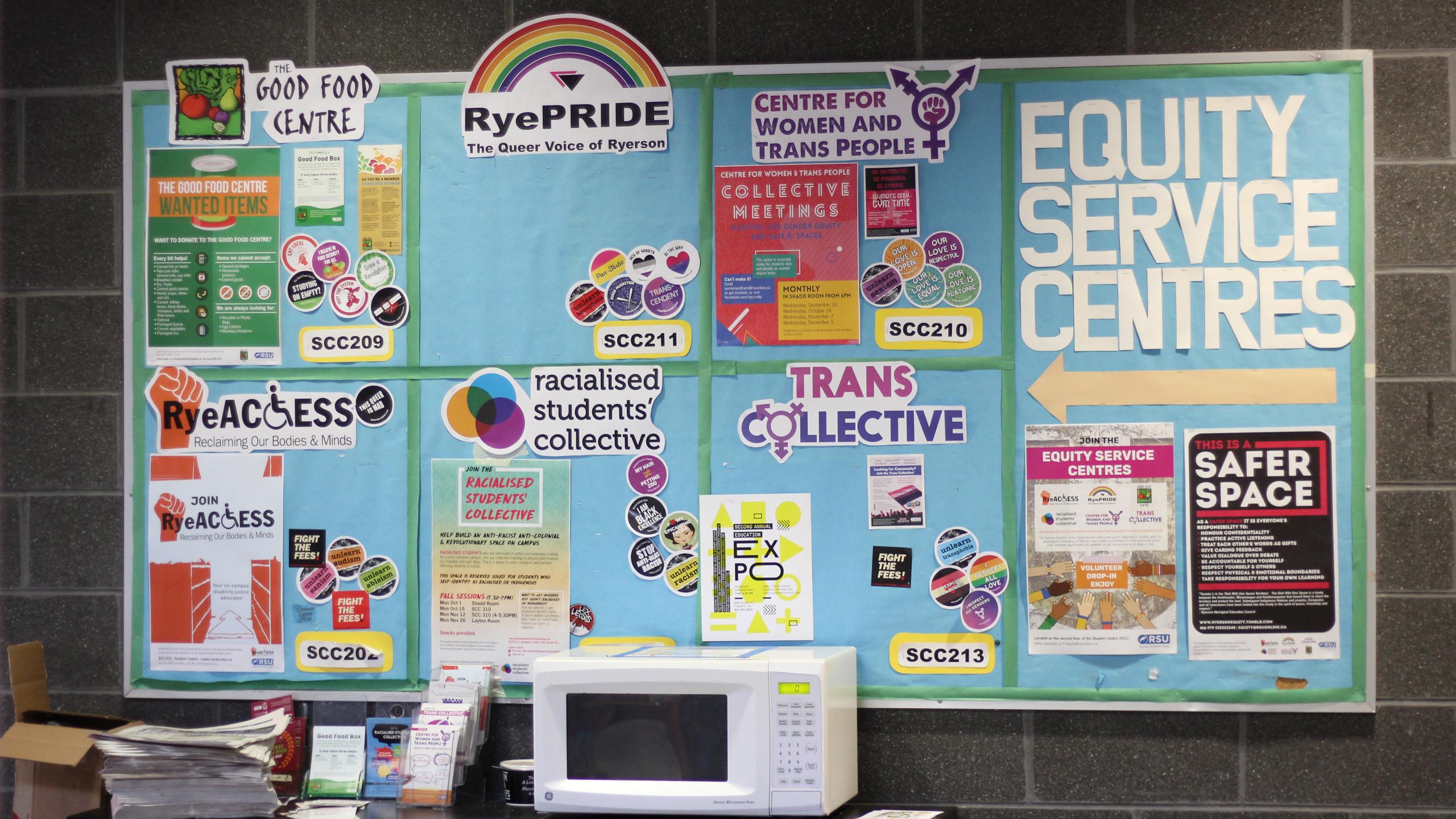By Lidia Abraha and Raneem Alozzi
The equity centres are run a lot differently than last year—by new people with new practices. Under new management, the centres have been holding fewer events than last year and students who use the services and work in them have told The Eye the centres are not safe spaces.
The centres, which are all located in the Student Campus Centre (SCC), consist of collectives that support marginalized students. They include the Centre for Women and Trans People (CWTP), Good Food Centre (GFC), RyeACCESS, RyePRIDE, Racialised Students’ Collective (RSC) and the Trans Collective. Karolina Surowiec, vice-president equity for the Ryerson Students’ Union (RSU) also oversees the RSU-run Sexual Assault Survivor Support Line (SASSL).
Surowiec said she would prioritize promoting the six equity centres to all Ryerson University students during her election campaign.
The Eye spoke to seven former and current equity centre staff, who expressed their concerns about the way the centres are being run.
“It feels like a completely different office space now,” said one of the current coordinators, who spoke to The Eye on the condition of anonymity in order to protect their job.
“I wish it wasn’t [and] I knew that was going to happen no matter what with new management…but I don’t know if I can say with confidence they’ve changed for the better.”
Every year the centres organize anti-oppression training early in the term. This year’s training was conducted one month into the semester.
“It should’ve happened way earlier, and it’s my fault for not organizing it,” said Ruben Perez, the new RSU equity and campaigns organizer. “I could give [the training], which I have no problem with, but I’d rather have someone that identifies with one of the communities to give it.”
“I don’t know if I can say with confidence they’ve changed for the better”
Early in the semester a staff member came in and asked the anonymous coordinator, “Are you a girl or a boy?” The coordinator said transphobic comments from new staff could’ve been avoided if the training was prioritized.
They added that they’ve had to educate people on a lot of basic equity terminology and microaggressions.
Former GFC coordinator Kimberley Vaz said one of the biggest issues facing the centre is workers’ unclear experience in equity organizing.
“We have people who know nothing about equity, who know nothing about the work that we’ve been doing and they’re making some pretty big decisions that are impacting the community,” Vaz said.
Before she was elected, Surowiec told The Eye that as a supporter of equity-based initiatives, she likes to come out to events but had never worked on any equity campaigns.
During the first semester of last school year, according to event pages on Facebook, the CWTP and the Trans Collective held 11 events. So far this year, they have held five and three events, respectively.
Last year, RyeACCESS held five events, the RSC held eight and RyePRIDE held 13. RyeACCESS has held three events and RSC and RyePRIDE held four each. These numbers don’t include collective meetings, since they are mandatory for each centre.
“It’s been pretty quiet around here,” said the anonymous coordinator, adding there has been low turnout for centre events.
Surowiec said she doesn’t think Facebook event pages are an accurate representation of the centres’ work. “It takes adjustment and getting used to the flow of things. It’s very understandable,” she said in an email.
There has been low turnout for centre events
Sheldomar Elliot, an RSC coordinator, said the centre is focused on planning Black History Month and other events for next term. This semester they have only held two events, in addition to bi-monthly collective meetings.
Hajer Mustafa, a new coordinator at the RSC, said she didn’t know about the RSC until a friend told her about it. “Once I got here I was a little uncomfortable at first because I don’t know how to approach things, and I’m not as well educated as other people are in this field.”
But Mustafa said that she has been working on the Queer Trans People of Colour (QTPOC) subcommittee and plans to organize an event about microaggressions with her fellow coordinator. “I’m learning, I’m here to learn and help people,” said Mustafa.
Weekly meetings with all the centres have also been cancelled this year. These were held to keep track of each other’s projects and encourage collaboration between centres.
Perez opted to narrow down the meetings so centres only meet with him individually and not with other groups.
Recently, a security guard dropped into the RSC office, according to Elliot and other community members. Elliot said it’s problematic for security guards to be in an office that’s a safe space for racialized students.
Ram Ganesh, president of the RSU, said it was a coincidence as he was sitting in there and invited the security guard, who was an old friend, into the space.
“It may be triggering for some folks. A lot of people have had really bad experiences with security on campus…or security guards in general, and they’re not much different from police officers,” said Elliot.
Despite the complaints, Perez said he’s satisfied with how the centre is running. The GFC had 700 visitors in October, which is 200 more than September, he said.
“Black History Month is coming up next semester. SASSL is preparing for a big launch, the GFC is full steam ahead, Trans Collective has trans-awareness month that’s going on right now. CWTP is partnering with TEDxWomen for a conference which is very exciting,” said Perez. “There’s a lot of projects in the works.”













Leave a Reply